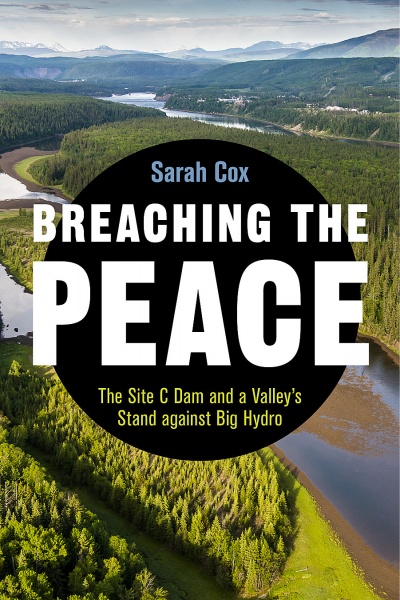Breaching The Peace is not a comfortable read. It’s not a happy read. But, it’s a necessary read for all British Columbians and Canadians, for whom the environment should be a dominant election issue. This book by Victoria-based journalist, Sarah Cox, is a comprehensive timeline of the highly controversial Site C Dam project that has been met with resistance from Treaty 8 First Nations, farmers in the Peace Valley, and environmental activists around the world. Described as a modern-day David and Goliath battle, Breaching The Peace investigates the somewhat suspicious, behind-closed-doors tale of how BC Hydro secured approval for Site C, and the lengths they have gone to intimidate and suppress resistance efforts.
At the centre of this book is Arlene and Ken Boon, who had a large section of their land expropriated. They became tenants in their own family home, their land now managed by BC Hydro, in an arrangement that seems more like bullying than politics. While Breaching The Peace introduces several key figures in the fight against Site C Dam — West Moberly Chief Roland Willson and fellow Indigenous leaders and elders — the Boons are the grounding anchor and case-study in Cox’s investigation. They have incredible will and determination to defeat the Site C Dam project, they are literally fighting for their lives.
This book is especially timely, as it coincides with other provincial and national debates around Indigenous consent and the ongoing colonialism manifest in large-scale industry development projects that alter Canada’s landscape. There is a section of the book that mentions the opposition to the Kinder Morgan pipeline expansion, the protests on Burnaby Mountain, the media attention that issue has gotten, and the bitterness of Peace Valley residents who feel that Site C isn’t as strong a priority to coastal communities, where BC’s population is more dense. This is a very real, very difficult observation.
Over the last several months in particular, Kinder Morgan’s questioning of the pipeline expansion in the face of Indigenous-led opposition — well-documented by major media organizations based in Vancouver — has proven the power of community organizing and resistance. Site C has had just as much opposition, perhaps even more when you consider the decades of strategic organizing that residents have done to fight off the dam, and yet, it is barely a headline issue these days. It’s debatable which project will have the most devastating longterm environmental impact. Opposition to the Kinder Morgan expansion is based on well-researched speculation— that a pipeline might burst, that the inlet might become polluted beyond clean-up, that marine life will be impacted by an increase of tanker traffic — but the flooding of the Peace Valley, the destruction of sacred Indigenous land, the displacement of sensitive species of wildlife, the irreversible pollution of what was once British Columbia’s most fertile farming land, is a sure thing. Site C is happening, right now. And John Horgan’s provincial NDP government that made the reassessment of Site C an election promise, has washed their hands of it.
If this pisses you off, read Breaching The Peace. Share this book with your friends and family. Arm yourself and your community with the history of the Peace Valley and Site C Dam opposition, the ongoing colonial violence, and demand more from your government and your media.


